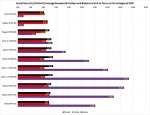Diesel
Banned
- Joined
- Jan 15, 2020
- Messages
- 2,998
- Reaction score
- 1,114
- Location
- NYC, USA
- Gender
- Male
- Political Leaning
- Slightly Liberal
1) The purpose of entitlement programs is *not* to provide a basic minimum standard of living. It is to provide a safety net for retirees and those going through temporary crises. It has now become a method of living because of entitlement sprawl.
We said the same thing in two different ways. I can tell you're prickly about entitlements, but don't take it out on me.
2) Unemployment isn't nearly that big a problem because it is time limited. If you want to look at a real problem look at SSDI. Look at how many people are now "disabled" due to obesity, nebulous claims of pain, and mental disorders. That is permanent largely and also gets you a free ride healthcare too. That's a good 40-50k a year forever.
I fail to see the value in ranking the wastefulness of government spending. It makes sense to tackle the biggest numbers first, but there is fraud, waste, and abuse throughout the government, including unemployment payments.
3) You support social programs proposed by Warren/Sanders? Which? Just to be clear, we are failing in the promises we have already made and you want to make more promises? That's precisely the lying to ourselves I was talking about. Medicare and SS are bankrupt, period.
No, it's not. Your doom and gloom for all of humanity predictions are sourced in experience, which is fine, but they aren't immovable. We can raise revenues without the economy collapsing. Remember that the economy was doing just fine before Trump tanked revenues by . . . wait for it . . . LOWERING taxes, not raising them. How's that residual benefit coming along? We can also reappropriate current spending to, say, provide universal pre-kindergarten without collapsing the economy.
4) I've underestimated what drives capital out? Hardly. It's data, lots of it from around the world. It is rather uniform and repeated time and time again. The best example of how these fail would be the Sanders/Warren unconstitutional wealth tax. Anyone who has over $100MM in net worth would immediately move. Bezos even joked around about how fast they could move the HQ from Seattle to Vancouver. That sort of idiocy takes the wealth tax rates to north of 100% on average.
Well, this thread was originally about the international interest rate cuts. You've consistently tried to derail it with your obvious disgust for Sanders and Warren (who isn't even running for anything at this point). I'm not going to assist you further in that endeavor.
5) Medicaid generally does not require employment except in certain states which have requested it to try and drive moochers off the rolls.
That's my point. A lot of Medicaid recipients aren't freeloaders. They want to work. Unfortunately, when they earn a modest wage full-time, they don't qualify for public insurance and they can't afford private insurance. So they work less than they can because it's their best option.
6) People do look at SS as a retirement plan, something it was never intended to be.
7) If you don't think regulations, taxes, and other government dictates drive business I will point you to Illinois, New York, Connecticut, Rhode Island, New Jersey, and California to a large degree. All the middle class jobs and households are fleeing those states as fast as they can. Why? The state has imposed taxes and regulations which have strangled them, their employers, and investment.
All the middle class jobs and all the middle class households and all the hundred millionaires, huh? Your view of economics is too political to be largely useful. I don't mean that as an insult. I just have watched your behavior in an otherwise nerdy and harmless thread.
Last edited:

